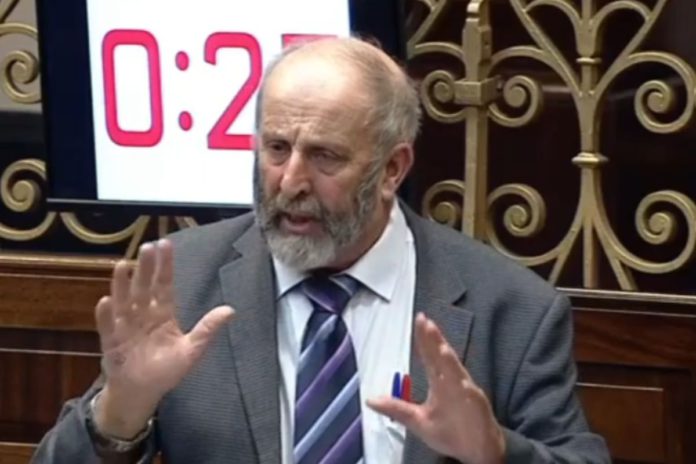Independent TD, Danny Healy-Rae, has called on Taoiseach and the Minister for Agriculture to clarify their plans for Ireland’s national cattle herd.
This comes after a heated exchange on the issue in Dáil Éireann yesterday (Wednesday).
Martin asked the deputy to “produce the quote where I said I am in favour of a reduction of the national herd”.
He called on the deputy to “produce the quote” and slammed his remarks as “untrue”. Healy-Rae challenged the Taoiseach to “disprove me if I am wrong”.
National cattle herd
In a statement, the independent TD said:
“The Taoiseach’s hostile attitude, when challenged in the Dáil yesterday, illustrates an arrogant disregard for farmers’ concerns to the government strategy to cap and cull the national cow herd.”
“Yesterday, I pressed the Taoiseach to precisely clarify his government’s plans for capping and/or culling the national cattle herd under the carbon emission targets. He arrogantly failed to answer, instead of attempting to mislead the Dáil.”
“Comments made by the Taoiseach in Moorepark on September 17th ruled out any protections for farmers from cutting cattle numbers under climate actions plans.”
“In fact, he went on to confirm that the Government wanted to ‘stabilise the national herd.’ Such vagueness is misleading.”
“Ironically, at the same event, the Taoiseach declined to confirm that restrictions on the construction of additional energy gazumping data centres would face similar cuts.”
“It appears that the lobbying power of foreign multinationals garners a greater degree of concern from government than the farming sector.”
Healy-Rae said that he, along with his colleagues, have been “consistently challenging” the government on this issue for months.
They sought a special derogation under the Climate Action Bill, which would have excluded the farming sector from any emissions’ target reductions.
“The government refused to support our position, meaning deep emission cuts for farmers.”
Agriculture
He highlighted that agriculture is Ireland’s most important indigenous industry. It employs over 164,400 people, incorporates 137,500 farms, and produces over €8 billion in economic output.
Therefore, he said the sector should be “fully insulated” from the damaging impact of climate action measures.
“The pandemic, Brexit and global geopolitical risks all highlight the risks to food security for our people.”
“However, despite this, the government plan to proceed with cattle culls and reduce the capacity of the national herd, which will only serve to deepen our reliance on imported beef from South America.”
He believes this attitude will contribute to global greenhouse gas emissions, create food security issues, and push up the cost of food for all Irish people.
He said speculation is now emerging that the agriculture sector faces an emission cut of at least 21%, which would be “disastrous” to farmers.
“It is very unfair to be penalising farmers and forcing them to pay carbon taxes in the absence of an assessment to determine what level of carbon farmers are currently sequestering.”
“Ireland has a long-standing heritage in agriculture and particularly beef farming. Farms are traditionally family-owned, passed from generation to generation, as is the craft and love of livestock farming.”
“The health and welfare of cattle are of utmost importance to farmers. Their concerns should never be dismissed by any government,” concluded the deputy.





